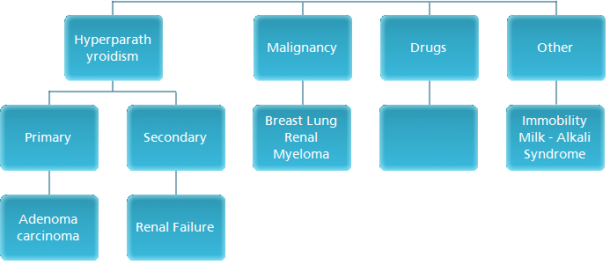Calcium - Hypercalcaemia
This content is under review.
Causes
Hyperparathyroidism both primary and secondary, primary from adenoma or carcinoma and secondary due to renal failure. Malignancy in other forms from breast, renal, lung and myeloma, medications, calcium, antacids, lithium, thiazides and also caused by immobility and milk alkali syndrome.

Symptoms and signs
The signs and symptoms of hypercalcaemia can be described in systems:
Neurological
- Lethargy, confusion, coma
Psychiatric
- Depression, psychosis
Renal
- Nephrolithiasis, polyuria, renal failure
Gastrointestinal
- Nausea, vomiting, constipation, pancreatitis
Other
- Proximal muscle weakness, bone loss
Management
At times urgent but not necessarily emergent treatment required so you do have time to discuss options.
You can begin fluid resuscitation immediately. Ensure euvolaemia prior to introducing loop diuretics as hypercalcaemia is usually associated with polyuria and thus most patients are dehydrated at presentation.
IV 0.9% saline rehydration
Dilutes Ca2+ in serum
Loop diuretics (e.g. frusemide)
Increases renal Ca2+ excretion
Biphosphonates
Inhibit osteoclast function in bone therefore decreasing Ca2+ into the serum
Seek advice before administration and in dosing. If an intravenous preparation is used it must be administered slowly.
Treat the underlying cause, which may or may not necessarily be part of early ED management.